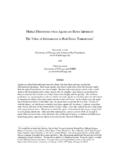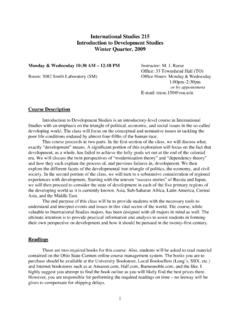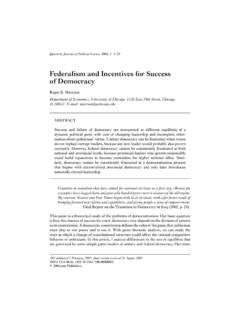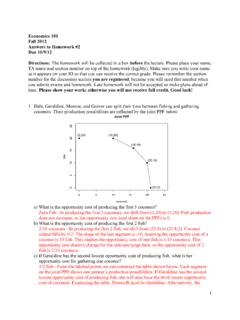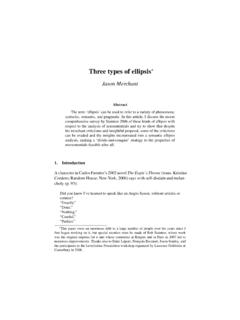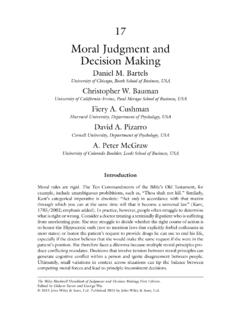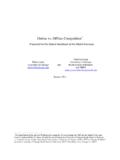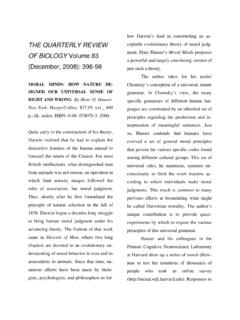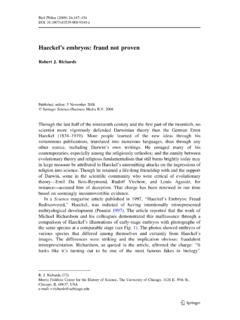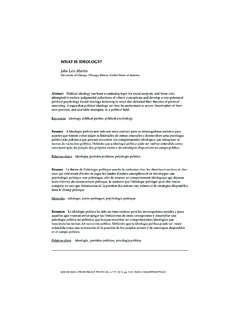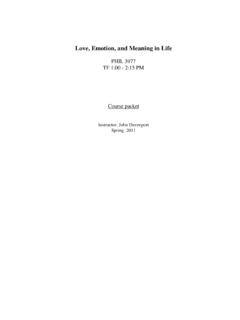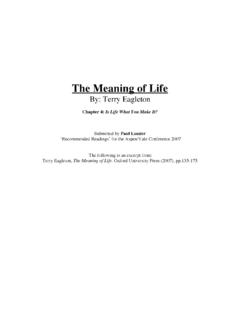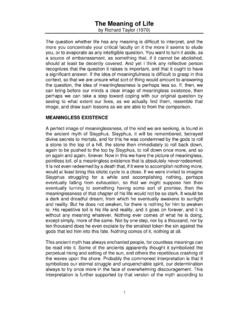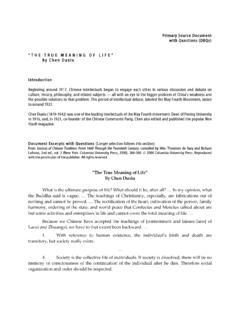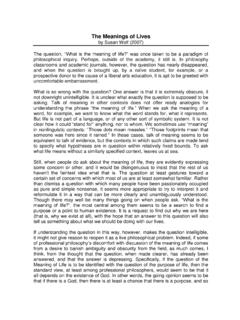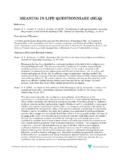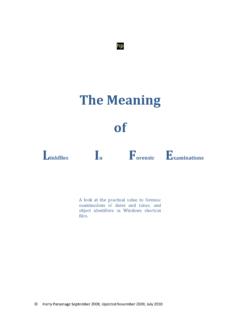Transcription of Prosocial behavior increases perceptions of meaning in life
1 Full Terms & Conditions of access and use can be found by: [Nadav Klein]Date: 18 July 2016, At: 07:15 The Journal of Positive PsychologyDedicated to furthering research and promoting good practiceISSN: 1743-9760 (Print) 1743-9779 (Online) Journal homepage: behavior increases perceptions ofmeaning in lifeNadav KleinTo cite this article: Nadav Klein (2016): Prosocial behavior increases perceptions of meaning inlife, The Journal of Positive Psychology, DOI: link to this article: online: 18 Jul your article to this journal View related articles View Crossmark dataThe Journal of PosiTive Psychology, 2016 behavior increases perceptions of meaning in lifeNadav Kleinharris school of Public Policy, university of chicago, chicago, il, usaABSTRACTF inding meaning in life is a fundamental personal need, and motivating Prosocial behavior is a fundamental societal need.
2 The present research tests whether the two are connected whether helping other people can increase helpers perceptions of meaning in life . Evidence from a nationally representative data-set and two experiments support this hypothesis. Participants who engaged in Prosocial behaviors volunteering and spending money to benefit others reported experiencing greater meaning in their lives (Studies 1 3). Study 3 also identifies increased self-worth as the mechanism participants who spent money to benefit other people felt higher personal worth and self-esteem, and this mediated the effect of Prosocial behavior on meaningfulness.
3 The present results join other findings in suggesting that the incentives for helping others do not necessarily depend on the prospect of others reciprocity. Prosocial behavior can be incentivized through the psychological benefits it creates for Prosocial the conditions necessary for human flourishing depends in part on the perspective one chooses to take. One can take the perspective of an average person and ask, what is necessary for an indi-vidual to flourish? Alternatively, one can take the per-spective of a community or a society composed of many persons and ask, what is necessary for a community to flourish?
4 Taking an individual s perspective will invariably high-light the necessity of finding meaning in life as a fun-damental personal need (Heintzelman & King, 2014a, 2014b). Viewing one s own life as meaningful is associ-ated with greater longevity, better physical health, and reduced depression and anxiety (Debats, Van der Lubbe, & Wezeman, 1993; Krause, 2009; Taylor, Kemeny, Reed, Bower, & Gruenewald, 2000). In contrast, taking a com-munal perspective will invariably highlight the necessity of Prosocial behavior as a fundamental communal need. Prosocial behavior is critical for creating the trust and cooperation necessary to sustain impersonal and com-plex societies and markets (Bowles & Gintis, 2003; Fehr & Schmidt, 1999; Hamilton, 1964; Henrich et al.)
5 , 2011; Trivers, 1971). The present research investigates whether the per-sonal and communal perspectives are linked. Specifically, I test whether helping other people can increase help-ers perceptions of meaning in life , thereby establishing an empirical connection between personal and societal are at least two reasons to predict that helping others can increase a sense of meaning in life . First, help-ing other people can increase helpers sense of self-worth, which is one of the basic needs that must be satisfied to achieve a sense of meaning in life , according to preva-lent theoretical accounts (Baumeister, 1991; Baumeister & Vohs, 2002).
6 Helping other people can increase self-worth because Prosocial behavior is universally admired and valued (Buss, 1989; Klein, Grossman, Uskul, Kraus, & Epley, 2015). Helping other people is a way for helpers to gain social acceptance and build a positive reputa-tion, which in turn increase helpers social status in their communities (Flynn, 2003; Flynn, Reagans, Amanatullah, & Ames, 2006; Grant & Gino, 2010; Lee, 1997). Because social acceptance is a critical determinant of self-worth and self-esteem (Leary, 1999; Leary & Baumeister, 2000), the reputational benefits of Prosocial behavior are likely to increase self-worth, which in turn can increase the sense that life is , another reliable predictor of meaningfulness is social connection with others (Baumeister & Leary, 1995; Debats, 1999; Lambert et al.)
7 , 2013; Stavrova & Luhmann, 2016). Accordingly, social exclusion and loneliness can lead to substantial psychological damage, including decreased sense of meaning in life (Cacioppo, Hawkley, Rickett, & Masi, 2005; Cialdini & Patrick, 2008). Helping another person is one of the most basic ways to estab-lish and reinforce social connection. Therefore, helping 2016 informa uK limited, trading as Taylor & francis groupKEYWORDSP rosocial behavior ; meaning in life ; well-being; helping; self-worth; self-esteem; social connectionARTICLE HISTORY received 3 october 2015 accepted 15 June 2016 CONTACT nadav Klein by [Nadav Klein] at 07:15 18 July 2016 2 N.
8 KLEIN test, the relationship between helping and meaningful-ness remains unclear. The present research provides three such empirical 1: nationally representative sampleAs an initial test, I used a nationally representative sample of adult Americans to measure the association between a particular form of Prosocial behavior (volunteering) and the sense of meaning in life , while controlling for various demographic Baylor Religion Survey, Wave 2 (Baylor University, 2007) contains a nationally representative study of religious values, practices, and behaviors (total N = 1648; women; age range = 18 96, Mage = , SDage = ).
9 Among other items, this survey contains questions rele-vant to the current research. Specifically, the survey asks participants to estimate the amount of hours per month they volunteer in three contexts: (1) volunteering for one s place of worship; (2) volunteering for the community, not through one s place of worship; and (3) volunteering for the community, through one s place of worship. Participants answered these questions on a five-point scale (0 = none; 1 = one to two hours; 2 = three to four hours; 3 = five to ten hours; or 4 = eleven or more hours). As the main inde-pendent variable for this study, I created a composite vol-unteering index by summing these three variables (range: 0 12; Mvolunteering = , SDvolunteering = ).
10 The main dependent variable was a question asking participants to indicate their level of agreement with the statement my life has a real purpose on a four-point scale (1 = strongly disagree; 2 = disagree; 3 = agree; or 4 = strongly agree). This was the only question in the survey pertaining to meaningfulness, and it is suitable for measuring perceptions of meaning in life because having a sense of purpose is integral to meaningfulness (Heintzelman & King, 2014a, 2014b). This question con-tained an additional option for undecided participants. I excluded the 95 participants who chose the undecided option, and also excluded 80 additional participants who failed to answer this question or failed to answer one or more of the questions pertaining to volunteering time, resulting in a usable sample of N = 1, verify that the potential association between vol-unteering and meaning in life is not explained by other variables, I controlled for demographic variables including education, income, race, gender, geographic location.
